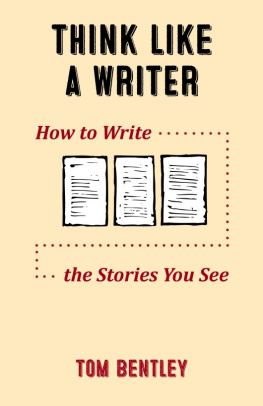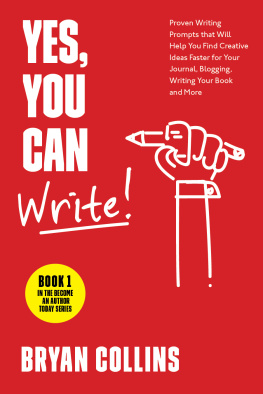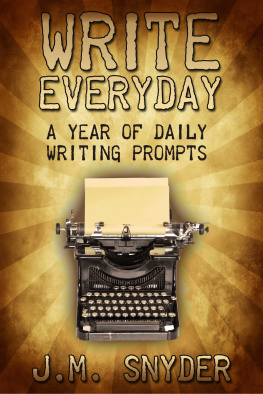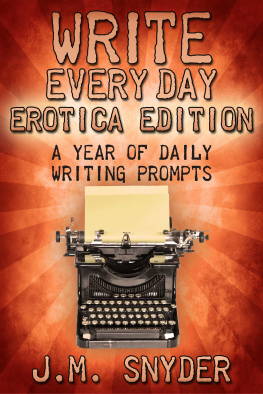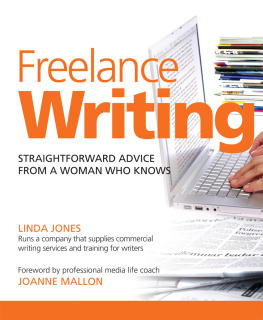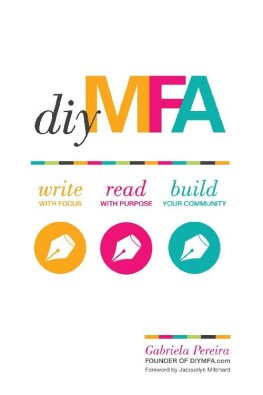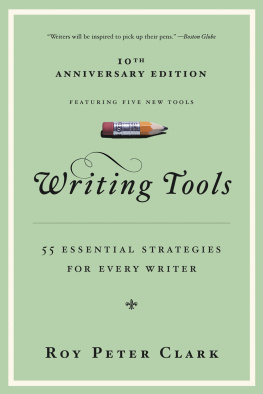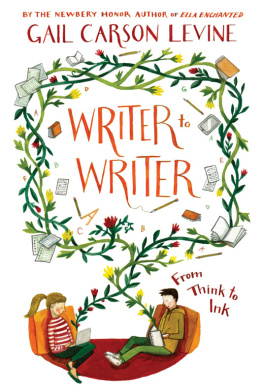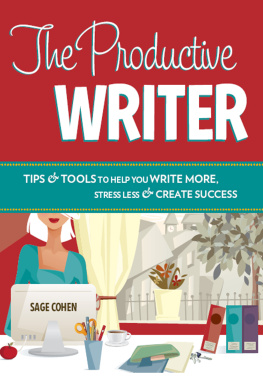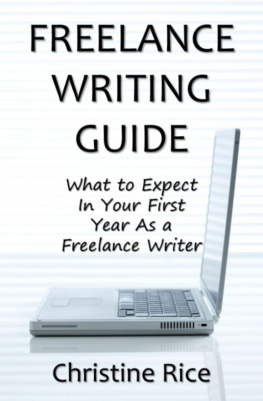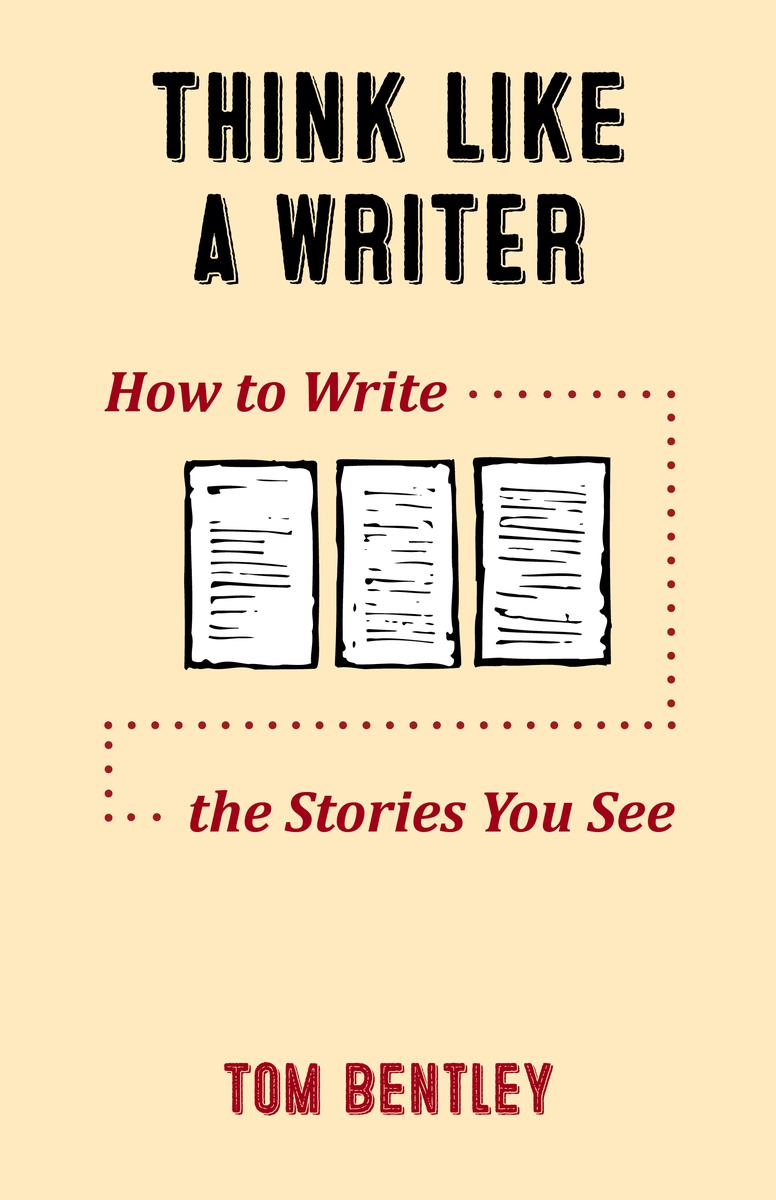
Think Like aWriter
How to Write the Stories YouSee
By Tom Bentley
Copyright 2015 by TomBentley.
All rights reserved. No part ofthis publication may be reproduced, distributed or transmitted inany form or by any means, including photocopying, recording, orother electronic or mechanical methods, without the prior writtenpermission of the publisher, except in the case of brief quotationsembodied in critical reviews and certain other noncommercial usespermitted by copyright law.
The Write WordPublishing
Watsonville, CA 95076
www.tombentley.com
Publishers Note: This is a workof nonfiction. Names, characters, places, and incidents are aproduct of the authors imaginationor in the case of names andcharacters, are actual people to whom I dont owe any money, andwho wouldnt be able to sue me for any anyway. Locales and publicnames are sometimes used for atmospheric purposes or to make youthink Im smart and well traveled. Any resemblance to actualpeople, living or dead, or to businesses, companies, events,institutions, or locales is completely coincidental. Except when itisnt.
Think Like a Writer: How to Writethe Stories You See / Tom Bentley 1st ed.
ISBN: 978-1-927967-47-8
Table ofContents
Introduction
Chapter One:
Dont Muzzle (or Muffle) YourWriting Voice
Chapter Two:
A Writer's Eyes Are AlwaysOpen
Chapter Three:
Slipping Through Various WritingFences
Chapter Four:
Writing Structures: Words, Sentences,Punctuation Marks, Oh My!
Chapter Five:
Writing Distractions and TheirDiscontents
Chapter Six:
PracticalMatters/Resources
About the Author
Introduction
Think of your favorite book. No, better yet,go and get your favorite book, feel its heft in your hand, flipthrough its pages, smell its bookness. Read a passage or two tosend that stream of sparks through your head, the alchemy thatoccurs when the written word collides with the chemicals of yourconsciousness: Delight is the fruit of that collision.
When I was seven or eight years old, Id walkto the nearby public library, and go into the section on dinosaurs.I would lie in the aisle for hours, surrounded by scattered stacksof books, driving through a landscape of imagination, fueled bywords. At first, I was simply thrilled by the stories of the greatbeasts, but after a time, I began to realize that I was taken bythe words themselvesJurassic, Triceratops,Tyrannosaurusand would say them softly aloud.
Many, many books later, it began to dawn onme that books were the conscious, choice-making work of authors. Istarted to fathom that a writer employed tools, framed acomposition, shaped its architecture. Deeper yet, that writing hada voice, that it was animated by a current.
When I was twelve years old, I was swimmingin the ocean and was tugged out by a small rip current that tookme, amidst slamming waves, against the supports of a public pier. Iscreamed for help at the people looking down at me; no one seemedto react. I was terrified that I would die, while enraged that noone cared. In my agitation, I didnt know that someone had called alifeguard, who quickly rescued me.
A Pin That Poked Deeply
Months later, for a class assignment, I wrotean essay in which I described in detail my fear, fury and despair.My teacher later read the story aloud, saying it was a vivid sliceof life. At the end of the year, the school handed out studentawards, and I was given a little cloisonn pin that said BestWriter. I knew before then that writing had an unusual power overme, but the commendation told me that language, even my language,could hold sway over others as well.
I read broadly, though wrote onlysporadically.
When I was fifteen, my parents granted me theindulgence of letting a friend paint, in a nice cursive script, thefinal page of Hesses Siddhartha on the wall, floor to ceiling, facingmy bed. I thought that constantly reading those mindful words wouldprompt some spiritual renaissance. My other teenage absorptionschecked that vow, but my interest in the power of words increasedall the more.
Hesse said in an essay: I want to dreammyself into priests and wanderers, female cooks and murderers,children and animals, and, more than anything else, birds and trees To me, hes talking about the force of imagination, theauthority of an authentic voice.
More and more, I came to see that the worldof imagination is the biggest world there is, and that a writer canwrite to see the unexpected, to know the hidden, to do as Asimovsuggested and think through his fingers. And that words can be sosensual you want to lick them.
Once Upon A Time
I saw evidence everywhere that people werestorytellers. They have been storytellers for ages, whether thewords were inscribed on resistant stone, delivered in a liltingvoice or caught in an electronic dance. I knew I wanted to be astoryteller too. However, I was still striking the anvil of ideaswith brute blows, yet to learn the deft stitchings and tight knotsin narratives fabric. But I wasnt discouraged enough not towrite. I tried poems, short stories, personal essays and more.
Twenty-five years ago, the San FranciscoChronicle accepted my article on my then 15-year correspondencewith the Jack Daniels Distillery, publishing it in the belovedSunday Punch section. I bought 10 copies, and sat on a bench inGolden Gate Park just staring at my byline, not even reading thearticle. Still not literature, not the stuff of Lears stormyfulminations, of Conrads lurid Congo, of Twains beckoning twang,but for me, word magic.
I finally realized that I couldnt wait forinspiration, a muse whose answering machine is all I gotwhen I called. So, since then, a couple of novels, a small-presspublished collection of short stories, a big basketful of essaysand articles, a new novel in s-l-o-w progress. And this book.
I write because language is a bright bird,uncatchable, but worth every attempt.
Confessions of a Word Drunk
I want to share that sense of beingword-drunk with you, how to open the bottle and pour yourself aglass. This book is about how to recognizenay, invoke yourwriting voice, how to see stories everywhere, how to net thoseelusive butterflies and imprint them on the page. Ill start theshow by sliding the big platter of how to find your writing voiceand how to see with a writers eyes into the center of thetable.
Then, there will be a palate cleanser on myown writing background as it relates to the writing life. Then,piping hot, a savory side dish about what works in the writinglife: how to coax (or more accurately, throttle back and direct)your writing ideas, and how to sidestep writing distractions. Thenlets share some dessert sugared with how to work with differentwriting structures (from their very letters to words to paragraphs,oh my! Characters and stories too).
Best to conclude with post-prandial cognac:the practical matters of writing tools and other writing resources,including links online to bright writing minds.
Lets head to that savory writing table.
Chapter One
Don't Muzzle (or Muffle) Your WritingVoice
I think about the issue of voice in writingquite often. You know, your writing voice, that whiff of brimstoneor reverberant cello note or cracked teeth and swollen tongue thatstamps your writing as having been issued from you alone. Manywriters, particularly younger ones, struggle to find their voice:the word choice, the cadence, the tone, the very punctuationthestuff that slyly suggests or that screams that you wroteit.
Youd never mistake Donald Barthelme forErnest Hemingway; the word blossoms gathered in Virginia Woolfsgarden would have flowers not found in the window-box plantings ofJoan Didion. So your writing and your writing voice shouldnt beconfused with Schlomo Bierbaumsit should be yours alone.
Next page
